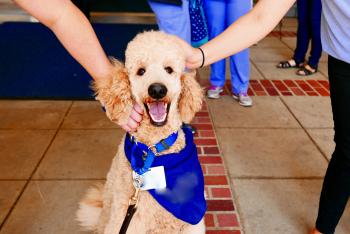This article explores how service dogs, emotional support animals and therapy dogs enhance the well...
Read MoreEffective Monday, January 5th, Inspira Health is now at Yellow Alert Status: Masks for staff, patients and visitors in all high-risk areas across our facilities are strongly recommended.

Attention-deficit/hyperactivity disorder (ADHD) is a neurodevelopmental disorder that affects many children (and adults) worldwide. According to the American Psychiatric Association (APA), an estimated 8.4 percent of children and 2.5 percent of adults in the United States have ADHD. The disorder is typically diagnosed in school-age children when behaviors become disruptive or problems with schoolwork emerge.
“Early identification and intervention are crucial to providing appropriate support and improving a child's overall well-being,” said Barry Berman, M.D., pediatrician at Inspira Medical Group Pediatrics.
Here is what you need to know about the signs and symptoms of ADHD in children, the types of health care professionals to visit and the steps involved in the diagnosis process.
Identifying the difference between an active, playful child and one with ADHD requiring therapeutic intervention can be complex. But there are a few tell-tale symptoms that can help parents decide when to take proactive steps to address their child’s needs.
Signs that your child may have Attention-deficit/hyperactivity disorder (ADHD) include:
“If you notice persistent and significant behavioral challenges in your child that impact their daily life, it's essential to seek evaluation from a qualified health care professional,” said Dr. Berman.
A primary care physician is often the first point of contact for parents concerned about their child's behavior. They can conduct an initial assessment and refer the child to a specialist if necessary.
Child psychiatrists or psychologists specialize in diagnosing and treating behavioral and developmental disorders in children. They conduct comprehensive evaluations that may involve input from parents, teachers and other caregivers to assess the child's behavior across various settings.
Licensed therapists and social workers help connect parents with resources about children with ADHD by providing education, guidance and support. They offer evidence-based strategies, recommend specialized programs and facilitate access to relevant community resources, empowering parents to understand and meet their child's needs while navigating the challenges of ADHD.
The diagnosis of ADHD typically involves several components:
Recognizing the signs of ADHD in children is crucial for timely intervention and support. If you suspect your child may have ADHD, consult your pediatrician. They can help you determine whether you need to be referred to a specialist for further evaluation and treatment.
“Through a comprehensive evaluation process, the health care professional will determine whether the child meets the criteria for ADHD and develop an appropriate treatment plan to address their specific needs,” said Dr. Berman. “Early detection and working together on proper intervention can significantly improve a child's quality of life and pave the way for a brighter future.”
Inspira Medical Group now offers pediatric services in Salem with personalized care for children from birth to age 18 or high school graduation.
Inspira Health is a high reliability organization (HRO), which means safety is the top priority for patients and staff. To make an appointment, call 1-800-INSPIRA.

This article explores how service dogs, emotional support animals and therapy dogs enhance the well...
Read More
Voluntary stays offer a proactive, empowered approach to mental health care by allowing individuals...
Read More
Social media poses risks to adolescent mental health, sleep and self‑esteem. By combining clear...
Read More